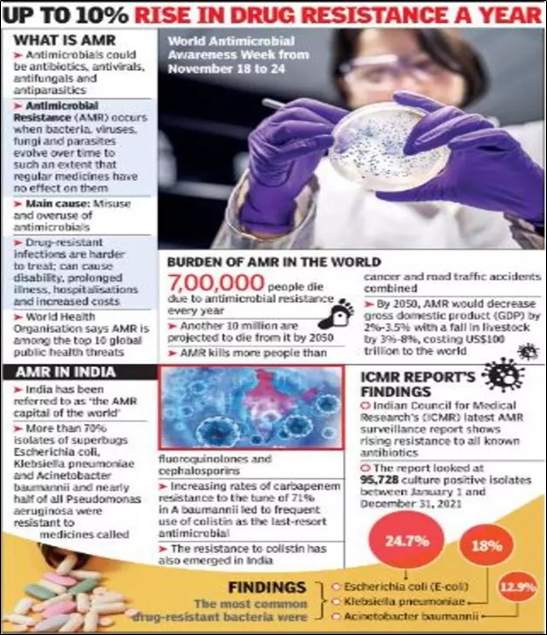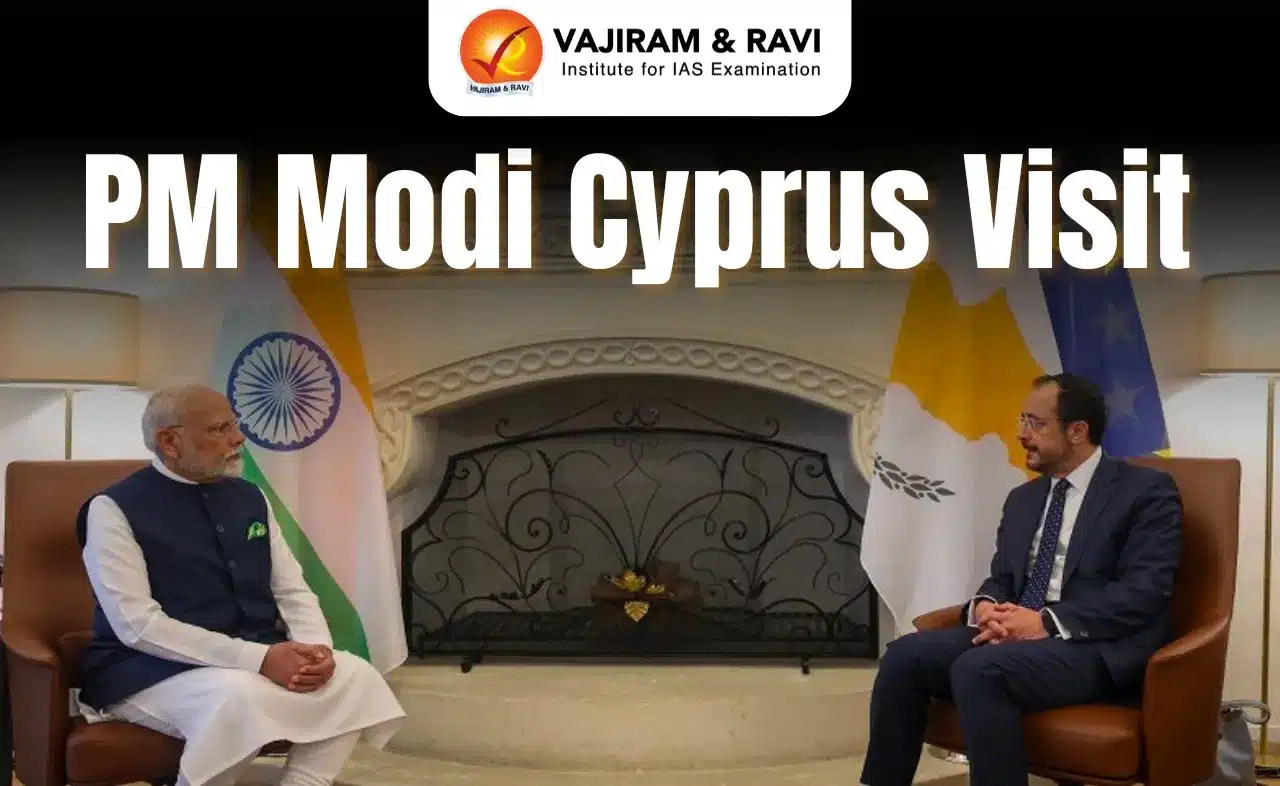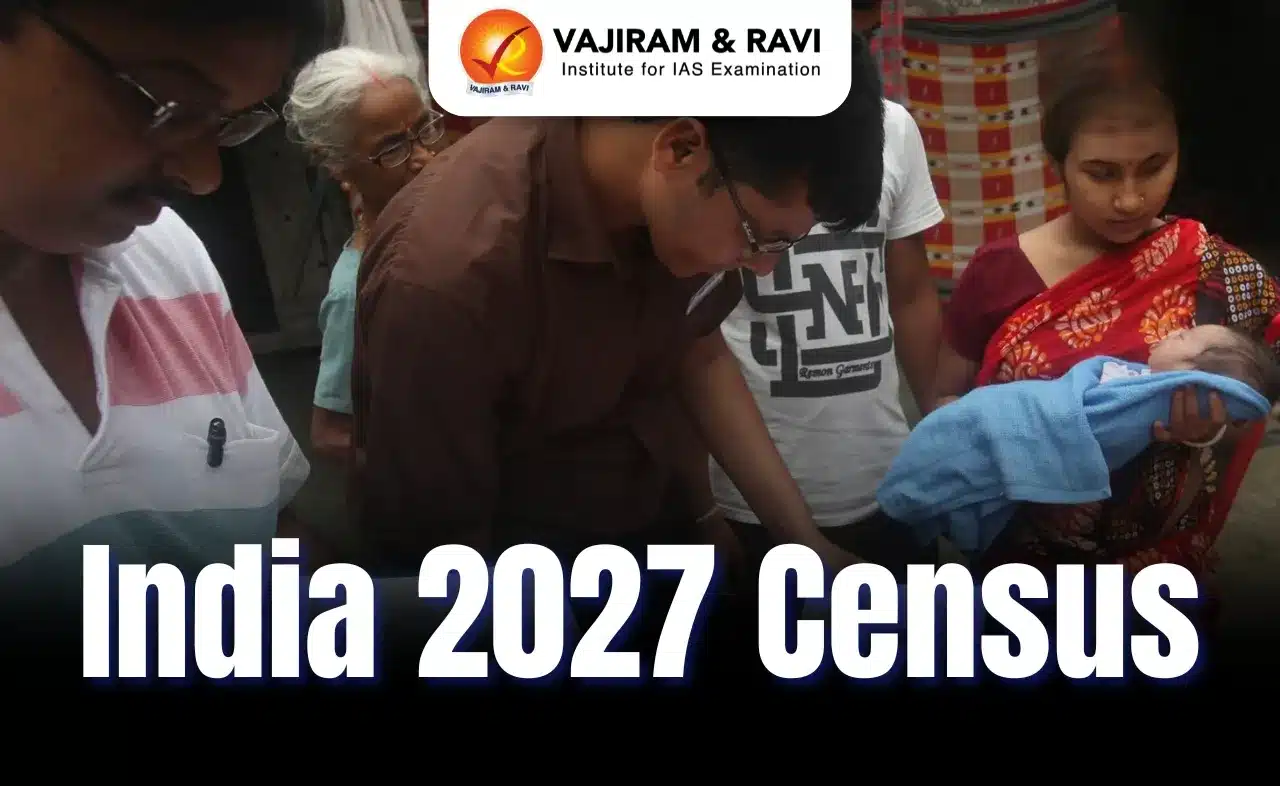What’s in today’s article:
- About antimicrobial resistance
- News Summary
Why in news?
- The World Health Organisation (WHO) has identified WCK5222, a made in India medicine currently undergoing clinical trials in various European countries, as a promising antibiotic under investigation.
- Developed by Aurangabad based Wockhardt Research Centre, the drug has recently saved the life of a Nepali national infected with Pseudomonas aeruginosa – a gram-negative bacteria resistant to all antibiotics.
Antimicrobial resistance (AMR):
- Background: Antimicrobials – including antibiotics, antivirals, antifungals and antiparasitics – are medicines used to prevent and treat infections in humans, animals and plants.
- About AMR:
- AMR occurs when bacteria, viruses, fungi and parasites change over time and no longer respond to medicines (develops drug resistance).
- This makes infections increasingly difficult or impossible to treat, increasing the risk of disease spread, severe illness and death.
- They can spread from person to person or between people and animals, including from food of animal origin.
- The rapid global spread of multi and pan-drug resistant bacteria – “superbugs,” is particularly concerning.
- As a result, WHO recently identified AMR as a major public health threat.
- This is a major concern because a resistant infection may kill, can spread to others, and imposes huge costs to individuals and society.
- The main drivers of AMR include:
- The misuse and overuse of antimicrobials;
- Lack of access to clean water, sanitation and hygiene (WASH) for both humans and animals;
- Poor infection and disease prevention and control in health-care facilities and farms;
- Poor access to quality, affordable medicines, vaccines and diagnostics;
- Lack of awareness and knowledge; and
- Lack of enforcement of legislation.
- Measures taken to address challenges posed by anti-microbial resistance (AMR) in India
- AMR surveillance network has been strengthened by establishing labs in State Medical College.
- National action plan on containment of Antimicrobial Resistance (NAP-AMR) focusing on One Health approach was launched in April 2017 with the aim of involving various stakeholder ministries/departments.
- Delhi Declaration on AMR– an inter-ministerial consensus was signed by the ministers of the concerned ministries pledging their support in AMR containment.
- AMR Research & International Collaboration: ICMR has taken initiatives to develop new drugs /medicines through international collaborations in order to strengthen medical research in AMR.
- Government of India has taken following initiatives to increase awareness about antibiotics misuse:
- ICMR has initiated antibiotic stewardship program (AMSP) to control misuse and overuse of antibiotics in hospital wards and ICUs.
- DCGI has banned 40 fixed dose combinations (FDCs) which were found inappropriate.
- Various IEC activities like public conclave, poster and quiz competitions have been conducted by National Centre for Disease Control.
News Summary:
- Antibiotic or antimicrobial resistance is on the rise in India, where antibiotics are frequently self-administered or prescribed by pharmacies.
- Resistance level is increasing by 5% to 10% every year for broad-spectrum antimicrobials.
- Multi-drug resistance is common in infections with gram-negative bacterias such as Acinetobacter baumanii and Pseudomonas aeruginosa in India.
- The 6th detailed report on AMR trends published by the Indian Council for Medical Research (ICMR) revealed that carbapenem, a strong antibiotic used to treat pneumonia and septicemia, is no longer beneficial to many ICU patients.
- New treatment alternatives for multi or extremely drug-resistant pathogens are urgently needed.
Last updated on June, 2025
→ UPSC Notification 2025 was released on 22nd January 2025.
→ UPSC Prelims Result 2025 is out now for the CSE held on 25 May 2025.
→ UPSC Prelims Question Paper 2025 and Unofficial Prelims Answer Key 2025 are available now.
→ UPSC Calendar 2026 is released on 15th May, 2025.
→ The UPSC Vacancy 2025 were released 1129, out of which 979 were for UPSC CSE and remaining 150 are for UPSC IFoS.
→ UPSC Mains 2025 will be conducted on 22nd August 2025.
→ UPSC Prelims 2026 will be conducted on 24th May, 2026 & UPSC Mains 2026 will be conducted on 21st August 2026.
→ The UPSC Selection Process is of 3 stages-Prelims, Mains and Interview.
→ UPSC Result 2024 is released with latest UPSC Marksheet 2024. Check Now!
→ UPSC Toppers List 2024 is released now. Shakti Dubey is UPSC AIR 1 2024 Topper.
→ Also check Best IAS Coaching in Delhi

























